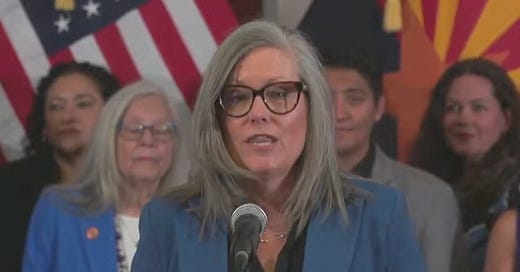Arizona repeals ban, shows possible course of action in states where initiatives aren't possible
Civil war era ban had restricted abortions in nearly all circumstances
Arizona abortion rights leaders had a massive victory in Arizona yesterday as Gov. Katie Hobbs signed a repeal of an 1864 ban that prevented abortions in nearly all circumstances.
In April, Arizona’s Supreme Court upheld an abortion ban that dated back to the Civil War. The ban, which had been enacted into law in 1864, bars all abortions except when the mother’s life is at risk. In their decision, the judges reasoned that since Roe was overturned, there was no longer any constitutional right that made the law moot. The ban was initially passed by 27 men before Arizona was even a state.
“I’m so proud to be the ones that got this job done,” Hobbs said at a news conference. “And while I’m proud to sign this bill and provide a moment of relief for Arizonans, we still have work to do. Arizona women are still governed by a ban that leaves no exceptions for rape or incest, nor does it account for complications during pregnancy.”
Hobbs said she had heard from doctors who had thought they’d end up in jail for performing abortions in light of the Arizona Supreme Court’s ruling. She had called for its repeal after the U.S. Supreme Court overturned Roe.
Before Roe v. Wade, the Arizona Supreme Court had decided that abortion was not protected under the state constitution.
Currently, abortion is legal up to the 15th week of pregnancy in Arizona. They allow abortions after that if the woman’s life is at risk. Fetal deformities are not an acceptable reason for abortions later in pregnancy. Much of this and an overall ban that had been on the books before Roe is now in litigation.
In June of last year, Gov. Hobbs signed an executive order that centralized abortion prosecutions with the attorney general’s office. The AG is another Democrat, Kris Mayes, who promised not to enforce the ban in question. Twelve of Arizona’s 15 district attorneys challenged the executive order.
This marks another approach for activists and feminists to take in securing abortion access in states that have limited or eliminated the procedure. In 24 states, ballot initiatives are not a possibility. So, the only recourse is to flip the state legislature and then repeal whatever bans or limits they have in place about abortion.
I read a book today about Hawaii’s effort to repeal its ban in 1970. It was Abortion Politics: The Hawaii Experience, written by Patricia Steinhoff. I plan on interviewing the author on Monday as part of my research for my forthcoming book.
Part of the method by which they helped turn public opinion dealt with the forums that they held to discuss abortion and why it needed to be permitted on the island. They had experts discuss them at those town halls. The Hawaii legislature, led by Sen. Vincent Yano, held hearings and had committee reports that examined all the reasons its ban should be repealed, including a belief that it would slow population growth, decrease the number of people on welfare, and an empowerment of physicians to make proper medical decisions for their patients.
Those town halls may be an excellent grassroots approach to flipping state legislatures. Additionally, In many places, Republican state representatives don’t even face a general election opponent. Fielding a candidate at least would possibly open the door to getting more seats in a legislature.
In Arizona, ballot initiatives are still possible. Activists are currently seeking to pass a ballot initiative. They recently passed the 500,000 threshold of signatures needed to get it on before voters. If passed, then abortion access would once again be legal in Arizona up to the point of viability.




